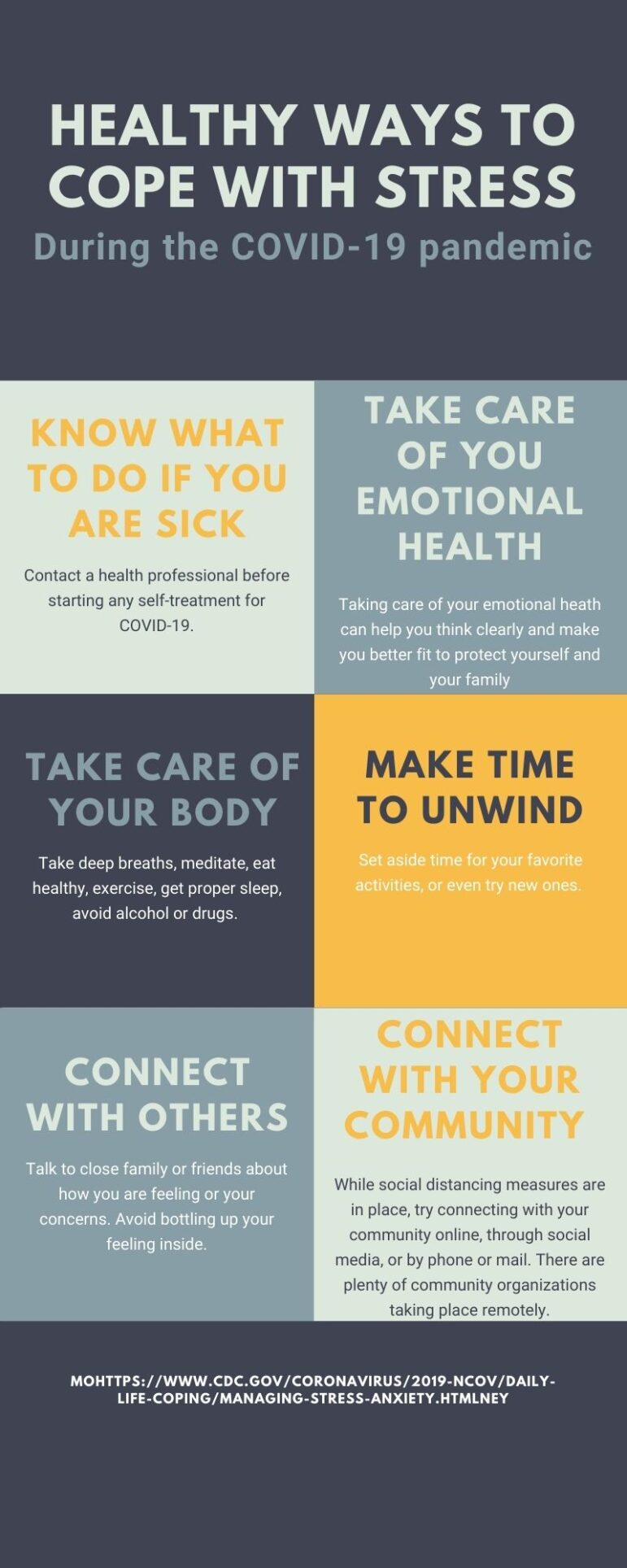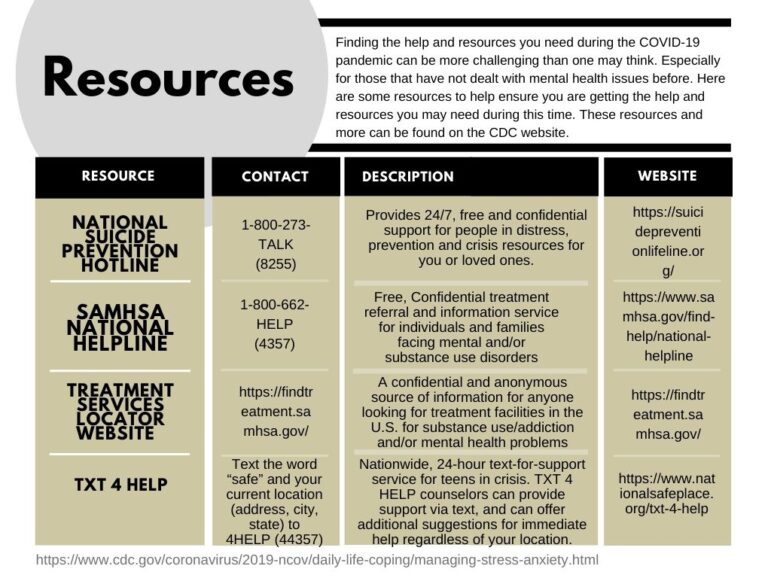Throughout the country, health professionals and college students reveal ways they are combating the effects of COVID-19 on their mental health.
According to the CDC, younger adults, racial/ethnic minorities, essential workers, and unpaid adult caregivers reported worse mental health, increased substance use, and elevated suicidal ideation.

As illustrated in the infographic, the CDC suggests coping strategies with stress and mental health during the pandemic, such as connecting with others and taking time to unwind.
Healthcare workers and students across the country, who have previously had the virus, point to ways that helped them cope during the quarantine.
Health care workers
Debra Aplis, 53, a nurse at a Texas memory care facility, experienced some rough symptoms but ultimately recovered well from the virus.
Aplis said throughout this pandemic, she experienced depression, mood changes and anxiety.
However, Aplis found new ways to distract her from the global pandemic and the effect on her mental health. Aplis said she began music therapy, reading and watching music videos on YouTube.
After recovering from COVID-19, Aplis donated her plasma for use by those battling COVID-19.
College students
A Vanderbilt University freshman, Anastasia Franchak, 19, said she spent her entire quarantine in her room.
Franchak is from Johns Creek, Georgia, outside of Atlanta. She experienced COVID-19 symptoms in early July and later tested positive on July 7.
Franchak’s brother has Type 1 Diabetes, so she did her best to avoid giving the virus to him and anyone else in her family. However, having no contact with people affected her mood and gave her more anxiety than she was used to.
“That’s what got to me, not having close contact with people,” said Franchak.
However, Vanderbilt University allows students to meet with a therapist for free during COVID, an opportunity Franchak took.
University of Tennessee-Knoxville freshman David Coffman, 18, said “It definitely wasn’t fun; it felt like having a sinus infection but just all the time.”
Coffman first experienced symptoms on Sept. 30 and then lost his a couple of his senses.
“People take taste and smell for granted, but it impacts the way you perceive a lot of different things,” said Coffman.
Danielle Gershen, 20, a student at The Ohio State University, tested positive on Oct. 3 for COVID-19. Collectively, the virus spread through her close-knit friend group. Gershen quarantined for nine days, and on day nine, she tested positive; it became part of a two-and-a-half week stay in quarantine. Overall, Gershen said she tallied five weeks in quarantine due to multiple exposures to the virus.
Click this link to hear more about Gershen’s five weeks in quarantine.
Gershen said everyone in her apartment began hanging out once the entire group tested positive for the virus. Having their own bubble allowed Gershen to focus on other things rather than the virus itself. Her close friends surrounded her, keeping her emotionally upbeat.
Despite her extended stays in quarantine, Gershen said she plans to continue to be cautious when exposed to the virus and take the necessary precautions to slow the coronavirus spread.

Different resources for those struggling with mental health issues during the COVID-19 pandemic. By Molly Gundry
The CDC recommended resources for those struggling with mental health during the pandemic. Furthermore, local students and professionals share new clubs and initiatives to combat the effects of mental health due to the pandemic.
Looking forward
The COVID-19 pandemic opened up the gateway for new clubs and initiatives focusing on students’ mental health.
Michigan State University student, Neha Iska, found an opportunity during the COVID-19 pandemic, creating the Mental Illness Association; this club came from an idea she thought years before the pandemic.
“I had the idea to create the club about two years ago when I was diagnosed with Bipolar 1 and ADHD,” said Iska. “It took a while for me to convince my friends that this would be a good idea. However, COVID-19 pushed a lot of my friends a bit over the edge, and I think many people, too. That was when the club finally burst into reality.”
The club fosters open forum discussions on mental illness. The organization’s goal is to provide a safe environment for MSU students to receive help from peers for mental health afflictions they may or may not be aware of, Iska said.
“The idea is that people could share their experiences and not feel alone,” said Iska.” I wanted to create that community where I could feel more comfortable so that others could feel more comfortable too.”
The club is set to begin in the spring 2021 semester. MSU students can fill out a Google form to join or to obtain more information.
Spartan Support
At Michigan State University, the Spartan Support Network creates an opportunity for students to talk with peers. Christian Demoss, director of operations, said multiple support groups are available throughout the week.
“It’s pretty relaxed; you can talk about whatever you want,” said Demoss. “For the most part, it’s just students talking about how things are going and sharing their college experience.”
Since the COVID-19 pandemic started, the Spartan Support Network has been hosting more events and posting mental health tips on Instagram.
“A lot of posts are about how to stay healthy and how to better manage mental health during these times,” said Demoss. “It’s harder than usual right now.”
Demoss said the group experienced a large increase in the number of students signed up for Spartan Support this year, mostly due to COVID-19.
The Spartan Support Network aims to give students a place to talk openly about mental health with others.
Focusing on initiatives
Williamston Community Schools is focusing on students’ mental health through the “Be Nice” student-led mental health initiative. The initiative focuses on raising awareness of mental health and suicide prevention.
This program’s main goal is to teach students how to notice changes in mental health in themselves and others, invite open conversation on mental health, and challenge them to get help and act as protective factors for one another, said Caitlin Wilcox, a Williamston High School social worker.
“We have a group of eight student leaders who meet biweekly, and they are really the backbone of the program,” said Wilcox. “It is a lot of their visions and their ideas, and we have three facilitators at the high school that help them carry out those ideas.”
Although Williamston adopted the program two years ago, the COVID-19 pandemic has forced the school to think of new ways to spread information about mental health. Students and staff have been focused on getting the information and action plan out to students and raising awareness of mental health throughout the school, said Wilcox.
“This year has been very different,” said Wilcox. “We made a ‘Be Nice’ Google Classroom to share resources with students on ways to combat poor feelings of mental health or how to reduce stress or how to stay organized with virtual learning. We also have a couple of students working on creating a separate website to add to our Williamston website that will have more information. We are trying to meet students where they’re at to provide information.”